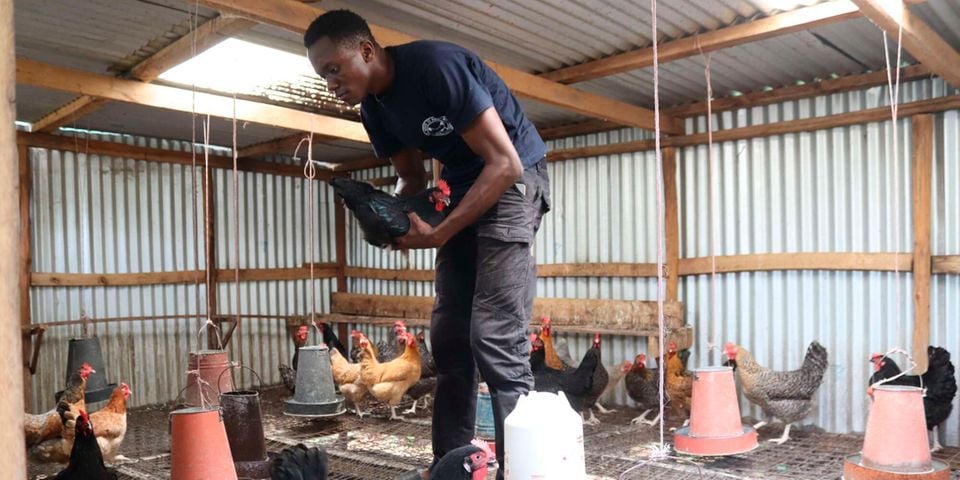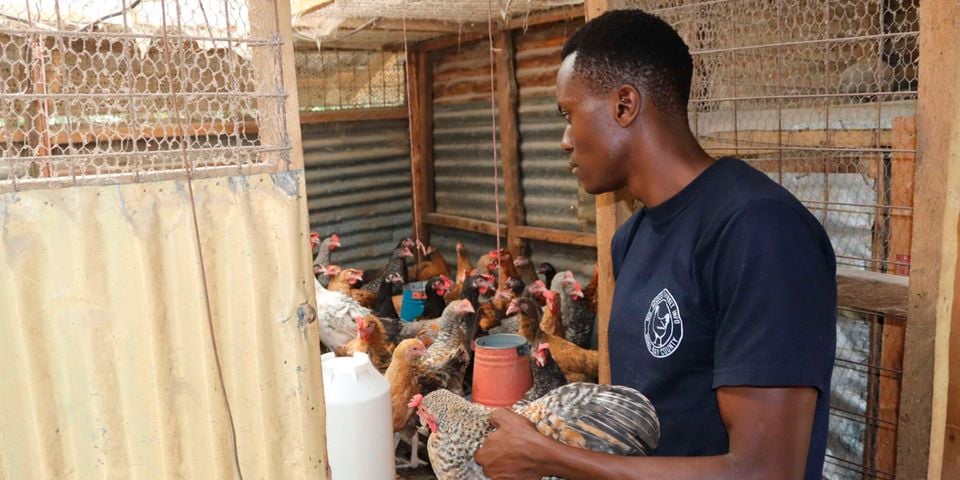29-year-old Emmanuel Omondi is the owner of Babarian Farms in Rabuor Masawa village on the outskirts of Homa Bay town.
The farm has grown in popularity because of its meat.
Omondi used to wait for buyers to walk to his farm and buy the birds for slaughter.
He eventually realized that selling chicken flesh would earn him more money.
Some people couldn’t afford a whole chicken. His business on the Homa Bay-Rongo road currently sells chicken bits. Omondi aspires to be Homa Bay’s leading chicken grower and meat supplier.
When the Seeds of Gold team arrived, two employees were cleaning one of the three coops. The coop’s 120 hens had been released to forage for natural debris on the ground.
But that was only a small portion of Omondi’s 350 birds.
His major feed consists of maize, maize bran, germ, and hydroponic feeds.
“Change from one company to another is a challenging as it takes time for the birds to get used to the new feed. We have adopted a system that favours farmers who have challenges accessing the same feeds every season,” he says.
To ensure the birds remain healthy, Omondi supplements the processed feeds with organic substances and grain matter.
“Apart from providing a balanced diet to the chickens, doing so is cheap and profitable too,” he says.
Before getting into the chicken business, Omondi worked as an accountant at a hotel in Nairobi. He was devastated on losing his job in 2017.
“I started with 45 birds as an experiment. Each was Sh350. I used Sh75,000 to build the coop. My intention was to produce and sell chicks,” the farmer says.
Unfortunately, things did not go as planned. The cost of feed was high and Omondi could not make enough profit to expand the business.

He had to look for cheaper alternative sources of nutrients for his birds.
He sought help from friends and family who advised him to try supplementing the feeds with maize bran and other organic substances.
Omondi is among farmers who have been trained on good poultry practices by an organisation called Practical Action.
“All the ideas came from the organisation,” he says.
After visiting friends for an exchange programme, Omondi began experimenting with feed supplements. His main supplier of maize bran is United Millers Ltd, Kisumu.
“I was advised to source brans and germ from big millers who ensure their maize is aflatoxin-free,” he says.
He buys the bran for Sh700 per 50-kilo bag and mixes with processed feeds at a ratio of 1:2. The formula is cheaper than using pure feeds.
The birds consume up to 45 kilos of feed daily. It means he would be spending Sh2,600 every day if he were to depend on pure feed.
On some days, he feeds the chickens with hydroponics. In this method, plants are not grown in soil. They are in mineral nutrient solutions instead. Omondi strictly uses maize grains.
“Sorghum or rice are alternatives but they are prone to mould. There is no cost required to do hydroponics, just a little training,” he says.
He has a special unit for Italian worms – a good source of protein for the birds. The worms keep the home clean too.
“Selling slaughtered chickens guarantees profits. Parts like heads, gizzards and even eggs are sold separately,” he says.
“To keep diseases at bay, I vaccinate the birds. My dogs keep predators and thieves away.”
Usomi Ltd CEO, Denis Mujibi, says mixing feeds cuts production costs. Usomi is a company that seeks to address poor adoption of agricultural technology.
He advises farmers to only mix feeds when they have the knowledge on nutritional ratio.









































